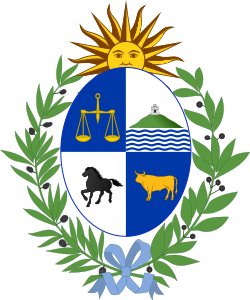 |
|---|
A constitutional referendum was held in Uruguay on 29 November 1942, alongside general elections. [1] The new constitution was approved by 77% of voters. [1]
 |
|---|
A constitutional referendum was held in Uruguay on 29 November 1942, alongside general elections. [1] The new constitution was approved by 77% of voters. [1]
On 18 June 1941 a group of General Assembly members had put forward constitutional amendments. [1] However, it was clear that the proposals would not be approved by a majority of voters, and President Alfredo Baldomir subsequently dissolved the General Assembly on 21 February 1942. [1]
A commission, composed of the largest party, put forward a draft constitution on 28 May, with some small changes to the previous amendments. [1] Baldomir then issued a decree stating that the new constitution would be approved if a majority of those voting were in favour, rather than the previous requirement, established in the 1934 constitution, of a majority of registered voters voting in favour. [1]
The new constitution would limit the President and Vice President to a single term in office. [1] It provided for a bicameral General Assembly, with a Senate elected by proportional representation. [1] The lema system would be abolished. [1]
Constitutional initiatives would be possible if supported by 10% of registered voters (reduced from 20%), with the General Assembly allowed to put forward a counter-proposal. Amendments would require a majority vote in both houses of the General Assembly, approval by a Constitutional Council, and then a referendum, in which at least 35% of registered voters must vote in favour. [1]
| Choice | Votes | % | |
|---|---|---|---|
| For | 443,414 | 77.17 | |
| Against | 131,163 | 22.83 | |
| Total | 574,577 | 100.00 | |
| Registered voters/turnout | 858,713 | – | |
| Source: Direct Democracy [1] | |||